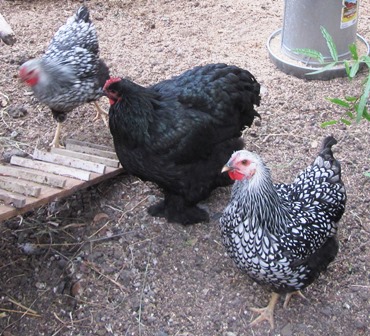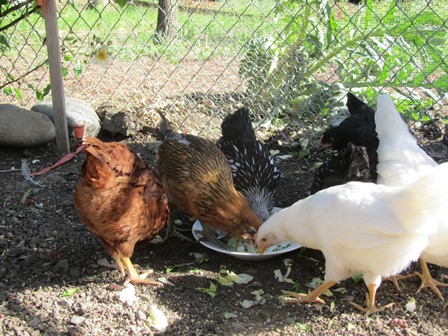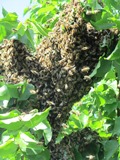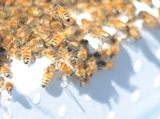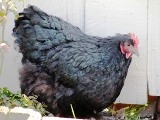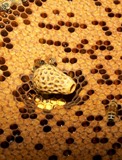Chicken Bad Behavior–Best Nipped in the Bud
Many factors can affect the health and egg laying of your chicken flock, including weather, housing, size of population, breed, molting, parasite load, and nutrition. But when chickens start viciously pecking other hens or eating eggs, the underlying issues must be addressed.
Most often, the issue is a case of stress. Causes of chicken stress include overcrowding, excessive heat, too much bright light, lack of food and/or fresh water, and bad diet.
Other factors can include disruption of the pecking order by introducing new birds, especially those of other breeds (for example, fowl with combs and those without) or mixing old fowl with young. These factors all relate to flock management.
When birds start eating eggs (usually finding a cracked egg or broken ones, tasting them, and then pecking eggs to break them to eat) or viciously pecking on other hens, it’s best to figure out what in the hens’ environment is causing the stress. The causes must be eliminated.
For more tips on farming and beekeeping, plus delicious recipes, check out my newest mystery–A BEELINE TO MURDER. See, http://tinyurl.com/p8d6owd
Henny Penny Farmer’s Almanac–Sayings
Humans could learn a thing or two from the world of honeybees where all endeavor benefits the entire colony, not an individual bee.
A tea made of meadowsweet, chamomile, or peppermint herbs can calm an upset stomach.
To get stronger egg shells, feed your chickens extra calcium.
Producing manure is easy; it’s the moving of it that takes patience and the right shovel.
Sow above-ground plants during a waxing moon and below-ground plants during a waning moon.
The simplest treatment for a bee sting is to get the stinger out.
Move chickens and bees at night; when they awake in the morning, the move is a fait accompli.
If you enjoy listening to songbirds, it might interest you to know the male is generally the singer since he uses song to attract a mate and defend his territory.
Birds don’t just sing; they call, and their calls are how they communicate
with a partner or sound the alarm that a predator is near.
Box and jug wines are fine as long as you never drink or cook with a flawed wine.
Use a dab of raw honey or bee propolis to treat a peck wound on a chicken as honey and propolis have antiseptic, antibacterial properties.
Each nostril of a dog’s highly sensitive nose can separately track scents—a skill proving useful to humans in finding illegal drugs, locating dead bodies, and even detecting cancer.
Red wine remains drinkable for decades because the tannins act as a natural preservative; however, the wine must be properly bottled and stored.
If you want to lower your cholesterol, decrease your stress level
and improve your blood pressure, adopt a dog.
Pacific oysters can engage in annual sex reversals; male one year, female the next—one of nature’s many surprises.
Help your chickens go through the molting process (when they lose feathers and stop egg production) by feeding them 20 percent more protein and limiting their stressors.
Time spent in a garden is a lot like yoga; it slows the breath, quiets the mind, and lets you get to the truth.
To break your dog’s habit of licking you, get up and go into another room
immediately when the licking starts so the animal will associate its licking with your leaving.
If you don’t want to be devoured by insects, wear light colors when gardening.
If you want to strengthen your immune system, consume a teaspoonful of raw buckwheat honey every day.
A honeybee queens live 10 times longer than her worker bee sisters and while they are sterile, the queen remains reproductive throughout her life.
To keep your bee colony strong and robust, feed your honeybees when their food sources become scarce.
To make a fat-free broth, pour the juices of a roasted chicken or turkey into a wide-mouth jar and refrigerate until solidified; then, skim away the fat that has risen to the top.
You can’t shift the status quo if you don’t take action.
When relationships sour like beans and bitter herbs, an hour in a garden
can generate the sweetness of new dreams.
©November 2013 by Meera Lester
Permission is granted for use of individual quotes, provided the quoted material contains the following credit: “Used with permission from Henny Penny Farmers’ Almanac.”
 Facebook
Facebook Goodreads
Goodreads LinkedIn
LinkedIn Meera Lester
Meera Lester Twitter
Twitter




